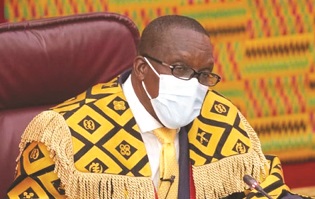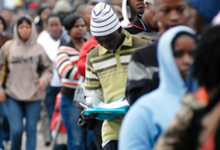
The past three weeks have seen tremendous agitation from Ghanaians home and abroad especially the proponents and opposers of the Promotion of Proper Human Sexual Rights and Ghanaian Values’ Bill since it came to light on Monday August 2, 2021. The Bill seeks to criminalise the promotion, advocacy, funding, and acts of homosexuality in Ghana and calls for very stiff sanctions on persons caught culpable of any of the above.Though the matter has been simmering underneath for a long time since 2000, the foremost event that has sparked fury has been the press conference and presentation of memo bythe ‘Human Rights Coalition’ and a ‘Coalition of Lawyers, Academics and other Professionals’ to parliament.
It must be stated clearly here that the‘Coalition of Lawyers, Academics and other Professionals’, who sent a memo to parliament to oppose the Proper Human Sexual Rights and Ghanaian Values’ Bill represent less than 0.001% of the total number of lawyers, academics and professionalsin Ghana and DO NOT REPRESENT OR CARRY THE VIEWSof all Lawyers, academics and professionals in Ghana.
Among the many arguments tabled by the advocates of the Gay community is the issue of ‘Human Rights’, which the advocates have sought to advance as a cogent reason why the bill should not be passed.
In the light of the so-called ‘Human Rights’ there are key questions that need to be answered to provide clarity to everyone. The first question is what is the definition of ‘human right’?
The Equality and Human Rights Commission define ‘human right’ as “Human rights are the basic rights and freedoms that belong to every person in the world, from birth until death. ….They can never be taken away, although they can sometimes be restricted – for example if a person breaks the law, or in the interests of national security. These basic rights are based on shared values like dignity, fairness, equality, respect and independence and …these values are defined and protected by law.”(Source:https://www.equalityhumanrights.com/en/human-rights/what-are-human-rights)
From the definition above, it is clear that ‘rights’ are not claimed by just anyone and for whatever purpose. It is are subject to national interest and based on ‘shared values’ of a people. Consequently, before an ideology can become a ‘right’, It must be agreed upon by a collective mass of people in a society and it must be subject to shared values of a people. It is therefore very intriguing that a few people can claim something as a ‘right’ when it goes against the generality of the people’s values.
So then, who determines what is a ‘right’? For instance, a person may claim that they feel naturally inclined towards raping married women. Or a person may claim that he gets a kick out of killing people and feels they are naturally wired that way. Should these people be GIVEN the right they claim to live out their ungodly inclinations or instincts? Definitely Not! What about people who ‘identify’ as various things. E.g., if a 60-year-old man identifies as a 20-year-old man, can such a person be compelled to go on retirement? If anyone can claim a ‘right’, then there will be mayhem society will break down into a chaotic mess.
So, to help further clarify the issue, let us ask ourselves and answer the question: Whose ‘Right’ is ‘RIGHT’?
The issue of Right has to be argued from three perspectives:
- The Right of Ghana as a Sovereign Nation to determine its own course and values
- The Right of Babes and Children who eventually get caught in the web through adoption by gay couples as a result of the need to raise a family.
These rights need to be argued vis-à-vis the claim to ‘Human Right’ being pushed by advocates for the LGBTQI+ community.
The Right of Ghana as a Sovereign Nation to determine its own course and values
Ghana, like all other nations obtained its sovereignty both by merit and by convention through the work of the United Nations. The United Nations at its foundation, signed a charter in San Francisco to guide the activities of its member states on June 26, 1945. The UN Charter subsequently came into force on October 24, 1945.
To prevent unwarranted interference by one nation into the affairs of another, the UN in Article 2 of the Charter agreed that:
ALL its member states had “sovereign equality” (Article 2:1)
“All Members shall refrain in their international relations from the threat or use of force against the territorial integrity or political independence of any state, or in any other manner inconsistent with the Purposes of the United Nations” (Article 2:4)
(Source:https://www.un.org/en/about-us/un-charter/chapter-1)
The West’s Encyclopedia of American Law defined sovereignty as: “The supreme, absolute, and uncontrollable power by which an independent state is governed and from which all specific political powers are derived; the intentional independence of a state, combined with the right and power of regulating its internal affairs without foreign interference”
This means that in ANY and in ALL matters, every nation and for that matter Ghana, reserves the ‘RIGHT’ to determine what it wants and where it wants to be at all times. It is therefore very intriguing that other nations e.g. UK, USA, CANADA etc. are seeking through varied means especially through their diplomatic lines and media to interfere in the issue of LGBTQI+ which is the topical issue of contention in our country today, under the guise of protecting the ‘Human Rights’ of persons with sympathy or affinity towards Gay/Lesbian lifestyles or so-called sexual preferences. These other nations are seeking through diplomatic, economic means and the work of lobbyists to COERCE African nations, who are SOVEREIGN, to give up their RIGHT to self-determination and succumb to their newfound love for obnoxious sexual orientations and other ‘licentious liberties’. They want us to go contrary to our prayer to God tohelp us resist the oppressors rule. And they have labelled these ‘Human Rights’.
So, whose ‘RIGHT’ is RIGHT?- The Right of Ghana as a Sovereign Nation to determine its own path and values OR the ‘so-called ‘Rights’ of a few individuals who have drunk from Europe and America’s cup of abomination?
It will be a sad and catastrophic tale if Ghanaians and Africa allow the regrettable pathological misfortune of a few individuals (too little to be classified as a minority) to overturn and submerge our sovereignty as a Nation in the name of ‘Human Rights’.
The Right of the people of Ghana as a democracy to decide on what is in their collective interest
In 1992, Ghana held its first election to democratically elect its leaders. It has since sought to consolidate Democracy as a system of government for its people. Prior to this, there were already established Traditional systems that were and still are the custodians of Ghanaian Traditional Values and customs. These, have over the years been nicely blended into our democracy thus allowing democratic values and traditional values to exist side-by-side. Far from overthrowing the Traditional Values, our understanding of democracy led to nationwide acceptance and entrenchment of traditional values such that traditional values still have a hold on us as a people.
Standing on its own leg, democracy in Ghana has resulted in an established understanding that all state matters can and should be agreed upon by the majority of the citizenry. Thus, we have embraced the ethos of democracy which stipulates that government must be:
“Of the People, By the People and For the people”
If that is the case, then the issue of the Promotion of Proper Human Sexual Rights and Ghanaian Values’ Bill merits being decided on by the majority of the people through their parliamentary representatives.
Consequently, it is expected that both Ghanaians and foreign interests will respect the democratic decision of the Ghanaian populace which is expected to be reflected in the passing of the Promotion of Proper Human Sexual Rights and Ghanaian Values’ Bill.
When the bill is brought to vote, I want to appeal to the Ghanaian Parliament to consider the question:
Whose Right is Right?
Research and media capture of Ghanaian voices on the issue of LGBTQI+ indicate a vast majority of Ghanaians of not less than 93% across board are against LBGTQI+ and will most likely want their representatives in Parliament to vote in favour of the passage of the Promotion of Proper Human Sexual Rights and Ghanaian Values’ Bill.
By and large, societies are governed by conventions and laws commonly agreed on. What is considered proper and acceptable norms or values are outcomes of social contracts which societies agree upon. Hence, the issue of whether to accept homosexuality as an alternate lifestyle or sexual preference is not subject to an individual or a group of individuals’ whims and caprices but rather to the desires of the larger society of which they are a part. That is why we commonly agree, for instance, that taking someone’s property without their permission is considered thievery and a crime to society.
This is the basic idea carried in Jean-Jacques Rousseau’s ‘Social Contract’ which revolutionized thought and politics in the French society and went on to shape law and politics across the globe.Following from Rousseau’s work, it is accepted that the righteousness of a society rests upon an agreement of equality and freedom of ALL. Furthermore, the social contract stipulates that this agreement MUST incorporate the will and aspirations of the entirety of all the citizens and demands that every individual renounce their individual freedoms in favour of our common good. Hence, the sovereign power of the people cannot be divided on basis of idiosyncrasies, especially if such interests are contrary to the general interest of the people. Rousseau surmises that a dissolution of the social contract will therefore result in a return to a primitive state and any society which breaks its social contract will no longer remain a society.
As a society, we have generally agreed that only heterosexual relations between a man and a woman will and can guarantee a continuity of the human race. On the contrary, homosexual relations cannot result in procreation and are therefore inimical to the survival of society. It is for this reason, as well research-evidenced fact that homosexuality increases the spread of HIV aids, debases the human species (to levels lower than that of animals), among others, that the generality of the Ghanaian society has rejected homosexuality.
It will be a great disservice and dishonourable for any parliamentarian to ignore or compromise the will of their constituents by refusing to vote the bill into effect.
“Whose ‘Right’ is ‘Right’?. Is it the ‘Right of the small cluster of individuals Or the Right of the plurality of the Ghanaian populace who abhor this ‘degenerative lifestyle?I strongly suggest to ALL Parliamentarians to critically consider this question: in deciding on which sides to support.
In addition to considering this question, I would also add my voice to the proposal made by hosts of a programme on Peace FM and the Coalition of Moslem Organisations that voting on the bill should be not be in camera. It should be televised and every parliamentarian’s vote be shown to the public for constituents to see which way their representatives in parliament voted on the issue.
The Right of Babes and Children adopted by homosexual partners
I have observed with consternation the ostrich-like attitude and behaviour regarding the adoption of children by gay and lesbian couples over the years. These children are obviously innocent and helpless orphans who have no real understanding of the intricate issues involved in homosexuality.
The UN Convention on children’s rights states that “Children have theright to give theiropinions freelyon issues thataffect them. Adultsshould listen andtake children seriously” (Right No. 12) and “Children can choose their ownthoughts, opinions and religion,but this should not stop other peoplefrom enjoying their rights. Parentscan guide children so that as theygrow up, they learn to properly usethis right” (Right No 14).
The above ‘Rights’ are inalienable and not transferable. Unfortunately, these ‘Rights’ are trampled upon when gay couples adopt children from orphanages and foster homes. The ‘Rights’ are trampled in the sense that these children are in a vulnerable situation which does not afford them the privilege of “giving their opinions freely” and choosing “their own thoughts, opinions ….”.
In most cases, children who end up in the custody of gay/lesbian couples are not children from stable homes but rather from orphanages etc.
So, when gay/lesbian couples demand the freedom to practice homosexuality and at the same time want to adopt children born out of heterosexual relationships, Children who do not have the sanctity of a secure and sound background to make choices,whose ‘Right’ is ‘Right’?.
These are the issues that anybody seeking to interrogate the issue of LGBTQI+ should consider before arriving at a conclusion.
From the foregoing, it is clear that when weighed in the scales, the so-called ‘Rights’ of the LGBTQ+ do not carry sufficient weight in comparison to the ‘Right of Ghana as sovereign nation to determine its own path, the ‘Right of Ghana as a democratic nation to decide on what the majority want and the ‘Right’ of children to choose where they want to live.
Let us as a nation, REJECT UNEQUIVOCABLY THE PRESSURE FROM THE SMALL INSIGNIFICANT NUMBER OF HOMOSEXUAL ADVOCATES AND THEIR SPONSORS, TO ACCEPT AN IGNOBLE LIFESTYLE AND SEXUAL ORIENTATION THAT IS INIMICAL TO THE WELL-BEING AND SURVIVAL OF OUR BELOVED COUNTRY GHANA.
Author details
Dr. Frederick Doe
- Senior Lecturer in Management and Organizational Behaviour, UPSA
- President, Haggai Leadership Alumni Association of Ghana
- Executive Director, Humane Organisations-Africa (HORG-AFRICA)
Email: dofrajal5@gmail.com
Contact: 0244733613





